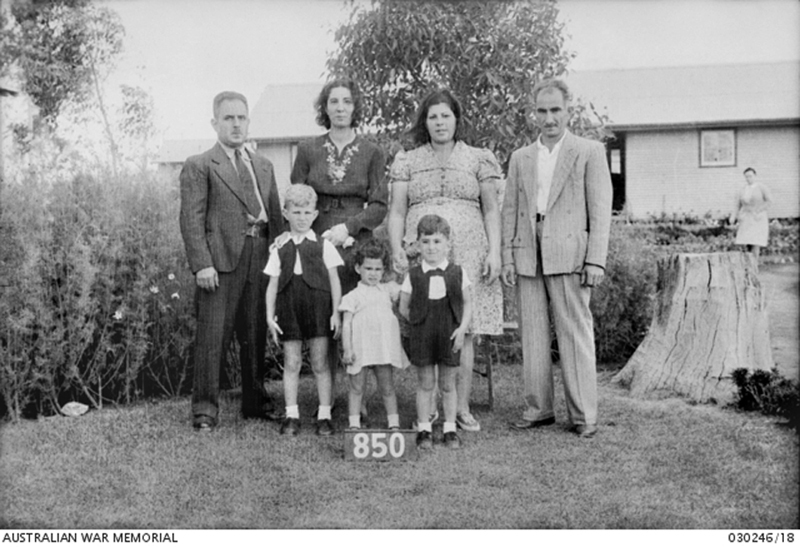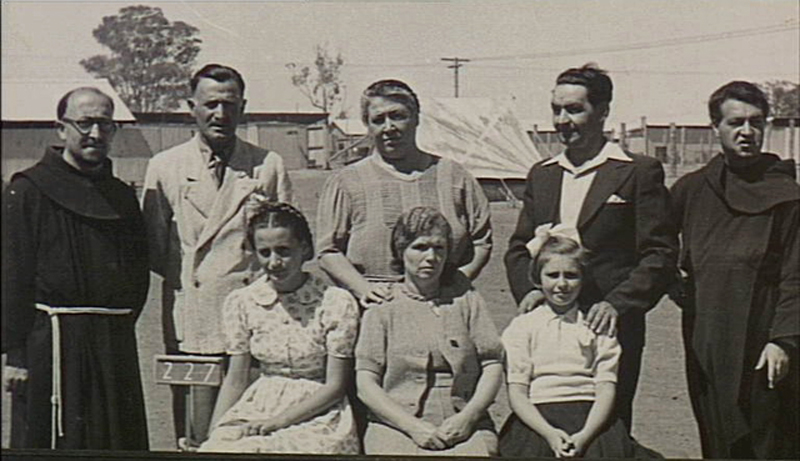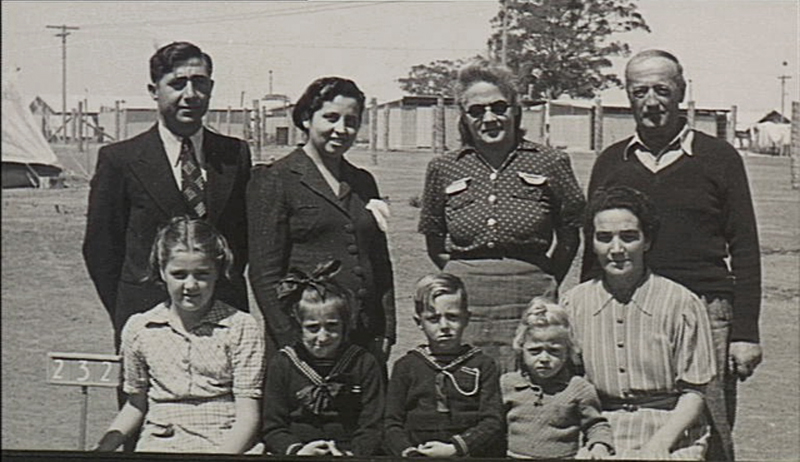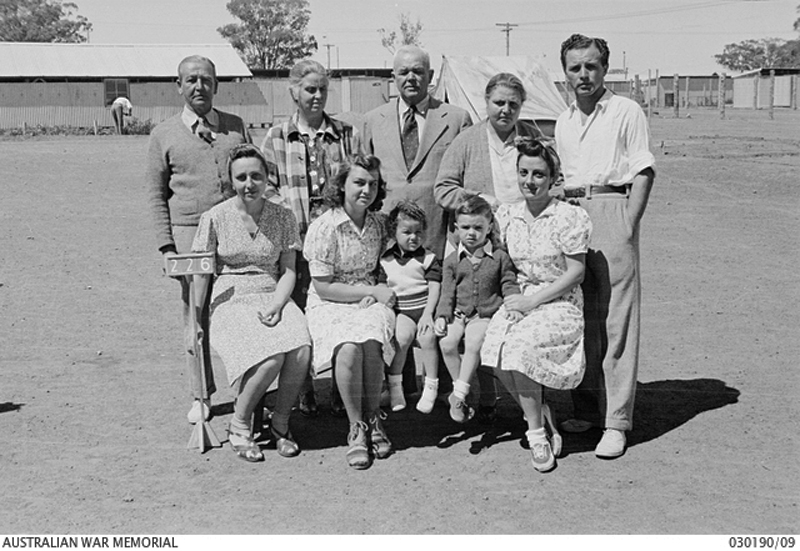
The Interviewees

Interview with Mia Spizzica, July 2019
1- When did you first find out about the Italian civilian internees in Australia / New Zealand?
While I was developing a research project for my PhD, I discovered that Italian civilians were detained as enemy aliens in Australia during WW2. One of these was my paternal grandfather who had migrated to Australia during the late 1920s. From this trajectory, I discovered that almost 5,000 Italian civilians - men, women, and children of Italian origin had been interned in prison camps all over Australia. These civilian prisoners were in addition to 18,500 Italian military POWs who were captured in North Africa, sent to Australia for imprisonment. In addition to the civilian Italians, there were other ethnic groups that were imprisoned including Germans, Japanese, Javanese and numerous other nationalities deemed to be the enemy of the Allies. Among the deported Italians, were three groups exiled by the British: the Italians from the United Kingdom saved from the sinking of the Arandora Star (deported on the infamous Dunera); the Levantine Italians from Palestine; and the Far East Italians held in Changi Prison by the British, before the fall of Singapore. In all, the deportees of the British were about 500 individuals – the very young, the old, pregnant women, infants, and the frail.
2- In 1941, the British, deported almost 200 Italo-Palestinians as enemy alien civilian internees, for indefinite detention in the Tatura Internment Camp, located 200 kms from Melbourne, Australia. Clearly in British military eyes these people were considered a ‘political risk’ with their perceived association with the Italian Fascist state at the time. How was this ‘risk assessment’ conducted, and was Australia particularly chosen as putting maximum distance from their remaining community in Palestine to prevent any communication?
I have limited information about risk management strategies employed in British Mandated Palestine. However, it is certain that the families that were perceived as pro-Arab or pro-Fascist were targeted as anti-British - even if they were not anti-British per se. Many Levantine Italians were disinterested in politics, but were perceived as being anti-British, because of their Italian nationality. The problem was the perception of being antagonistic to the Allies, rather than the reality. For example, love for Italian culture, language and education were viewed as pro-Fascist. If a family’s children were sent to the Italian college they were perceived as being fascists. Sometimes nations can react in primal way to protect themselves, even if innocent civilians unnecessarily suffer the negative ramifications of war.
3- Clearly you had the privilege of being able to interview some of these internees now settled in Australia, but clearly you had to treat them with sensitivity as they clearly went through a horrendous ordeal for which the government British or Australian has never apologised? Clearly these people kept a layered identity where all 3 strands of their ancestral, earlier and later residential cultures manifested themselves in their outlooks. How difficult was to access these people, gain their trust and go deeper in these interviews where clearly there must be a residual pain?
It’s a very sensitive matter. In essence, I needed to leave aside a lot of questioning when internees began to recall negative feelings about the impacts of the war. Some interviewees simply chose to recall only the pleasant memories. Others chose to actively forget their Levantine identities in order to negotiate a future for themselves and their families. In my view, the researcher needs to have very sensitive counselling skills to deal with the many issues that emerge from opening old memory wounds. Once a sad memory is triggered, it needs to be healed, by discussing the feelings that surface and reconciling the past. It’s a privilege and a serious responsibility, to conduct such intimate interviews.
4- Although as a Foundation we are supposed to be informed of the Western European presence in the Levant, we knew nothing of the Italian-Palestinian presence. Clearly these people came in different waves, from different regions of Italy and filled different cultural hybrid worlds on that coast. How did you categorise these different origin / cultural admixture communities and do you think in their heterogeneousness they were truly ‘Levantine’ as opposed to the broad sweep definition we apply to all ‘long-term expatriates’ in the better known port hubs of the Levant?
This is a complex question. The answer is very complex as well, so I’ll pass on the details. Suffice to say that I looked at the lingua franca in each household, as well as the origins of the wife and husband to ascertain how ‘Italian’ a family was in actuality. The length of time away from Italy - say 3+ generations (as the post WW2 Italian Diaspora of Australia now is) influences how much of the Italian Levantine, Arab, Jewish, Templer, French, Greek, or other culture each family incorporated in their daily lives. Self-identity is very complex and can change according to who one interacts with. Try to work out how you would classify each person you interact with …now ask their families how they identify that same person. You may be surprised how diverse the answers could be! I may identify myself as Italian living abroad, but others may categorise me as an Australian, because that’s how they see all people who live in Australia. In the case of the Italian internees I call the ‘Italo-Palestinians’, each family can decide if they agree or not to this identifier. So far, everyone I have interviewed has liked the title.
5- Were there voices of protest compassion at the time for this harsh detention of civilians of Italian extraction in Australia, clearly coming from a whole range of destinations?
In Australia, there were individuals who supported their Italian neighbours. However, the Levantine deportees, only had infrequent visits from the Papal Delegate, and the International Red Cross Delegate. On a positive note, the military priest who was under the auspices of Rev. Dr. Daniel Mannix the Catholic Archbishop of Victoria (an Irishman who detested war), was well thought of by the interned Italians at Tatura.
6- Are you the ‘lone voice’ still campaigning for some sort of official recognition of a historic injustice / apology / possible compensation?
Short answer: Yes, possibly! None of the internee families believe that we will ever receive an apology or compensation for their many losses. They endured numerous unnecessary sufferings as innocent civilian victims of war. Even though they did not die during internment, as millions did in some concentration camps, they were still adversely affected by wartime internment.
7- Why do think a country that sees itself as liberal democracy has this ‘blind spot’? Could there be a hidden anti-Italian prejudice in that Anglo dominated country still lurking?
This is a very good question. My answer can only skim the surface of the deep and complex cultural issues raised by the question. My view is that some Australians exhibit an unresolved, subvert negative attitude towards the ethnic ‘other’. Perhaps this attitude could be linked to its convict origins and more specifically, it’s complex colonisation narrative. There is one dimension that stands out: the Darwinian perception that Australia Felix was Terra Nullius. In my humble view, an attitude of the superiority of the British ‘race’ has imbued every aspect of Anglo-Australian life, and therefore the sense that non-British (non-white, ‘dark’, ‘yellow’ or ‘olive’ others) are unworthy of an apology or restitution. In essence, how can a coloniser that classified Indigenous People (Aborigines) - the First Nations - as ‘flora and fauna’ until the 196os (when Indigenous Australians were given the right to vote and first counted in the national census of human beings living on the content). This is a colonial attitude that Australia still needs to work through and resolve. This is a very sore point of historical injustice that is seeps into Australia’s attitude to the ‘other’. Hence, until the 1980s, Italians were simply part of this continuum of the lesser other. Nowadays, Italians in Australia are well-received as their children are largely assimilated into Australian culture.
If your readers are interested in the journey of Indigenous reconciliation, they can locate much on the Uluru Statement from the Heart (2017). The answer they received from the current government will explain much about the ‘blind spot’.
8- Are you aware of how the Italian ‘Levantine’ communities of Syria, Egypt, Libya etc. were also subject to deportation / imprisonment and do you know the locations and was there any seeming logic in the selection of these places of incarceration?
Yes very aware – we have many of these Italian Diasporas in Australia that arrived in post war 1950s and 1960s. I have had an Italian Egyptian in my extended family, and know a number of Levantine Italians via my research. These people arrived in Australia in the immediate post war period. Some were interned in Egypt or elsewhere in the Levant during the war and migrated to Australia. Some live in Melbourne.
9- Post-war Palestine was clearly a chaotic place with Jewish and Arab militias conducting operations against each other and outrages against the British forces there leading up to the Israel being established in 1948. So presumably in this environment most if not all Italian families left for other countries and I guess none of the internees from Australia returned there?
Good question! The short answer is yes’’. None of the families deported to Australia returned to Palestine. The full answer is much too complex to relate here. I’ll need to conduct a lot more research to answer this question.
10- On the wider aspect of ‘Italianness’ in cultural identity do you think language, or at least a basic knowledge, is the primary defining factor in that designation?
Each family defined their own ‘Italianicity’, which changes over time, and can indeed vary from day to day, interaction to interaction. In fact, one could suggest that being ‘Italian’ changes from village to village. Region to region in Italy, let alone outside Italy. Italianicity can also depend on who one marries and how children are raised. In some locations, education and middle or upper-class cultural values are stronger than a sense of being ‘Italian’.
11- Do you think the immense distance of Australia creates its own sense of heightened nostalgia to compensate for that clear break?
Most definitely yes! This memory was critical to survival or non-survival of the older Levantine internees. Most of the older internees died within 3-10 years of release from Tatura Camp 3A, even though many were not so old. To survive overt, harsh racism towards Italians in Australia immediately after the war, children of the Tatura internees became acculturated very quickly into an Anglo-Australian culture to survive and to achieve economic stability in their lives. It’s a very long story that we will discuss in our next book on the Tatura internees.
12- Is there more work for you in exploring the stories of this Italian-Palestinian community?
Many years of work yet to do! There seems to be only one Italian family living in the old Italian area in Israel now. Who knows, we could discover more than one family, but this will take time and connections.
13- Do you need help?
Thank you for asking! Many things I can only do myself …– It would be good to explore links in the current Levantine populations in various Diaspora communities. There may be Arab-Italian families still in Israel, Syria, Jordan, Egypt, or Lebanon whose families were in Palestine during War Two. I’d like to discover what happened to these families and if they still have links with the Italo-Palestinians in Australia.
There are Levantine archives in the UK, Singapore, and Israel? It would be wonderful to examine letters and archival records to make sense of what happened to the 500 deportees of the British government during the war.
Interview conducted by Craig Encer
Ms Spizzica has published a book Hidden Lives: War, Internment and Australia’s Italians, 2018 and is currently working on these book projects (working titles): A War within a War: The Impacts of internment on Australia’s Italians; The Taturians: Levatine and Far East Italians interned in Australia during WW2. Her most recent presentation was ‘Embodying hybrid transnational identities: The case of the Italo-Palestinians of the Antipodes’, Between Immigration and Historical Amnesia, MUMA, Genoa, Italy, 27-29 June 2019.

An Arab-speaking Italo-Palestinian family: Tatura, Australia. 10 March 1945. Group of Italian Internees at No. 3 Camp, Tatura Internment Group. Back row, left to right: Augusto Paoletti; Alice Paoletti; Badrie Paoletti; Francesco Paoletti. Front row: Cesare Paoletti; Lucia Paoletti; Remo Paoletti.

Italian-speaking Italo-Palestinian families with priests: Tatura, Australia. 13 February 1943. Family groups of Italian internees from overseas now interned at Tatura Internment Camp. Back row, left to right: L. Cigliani; G. Centonze; E. Centonze; F. Grilli; F, Galanti. Front row: L. Centonze; F. Grilli; P. Grille.

Italo-Palestinians: Tatura, Australia. 13 February 1943. Family groups of Italian internees from Palestine now interned at Tatura Internment Camp. Back row, left to right: D. Fortuna; E. Fortuna; G. Casati; L. Casati. Front row: A. Casati; M. Fortuna; C. Fortuna; C. Fortuna; E. Corona.

